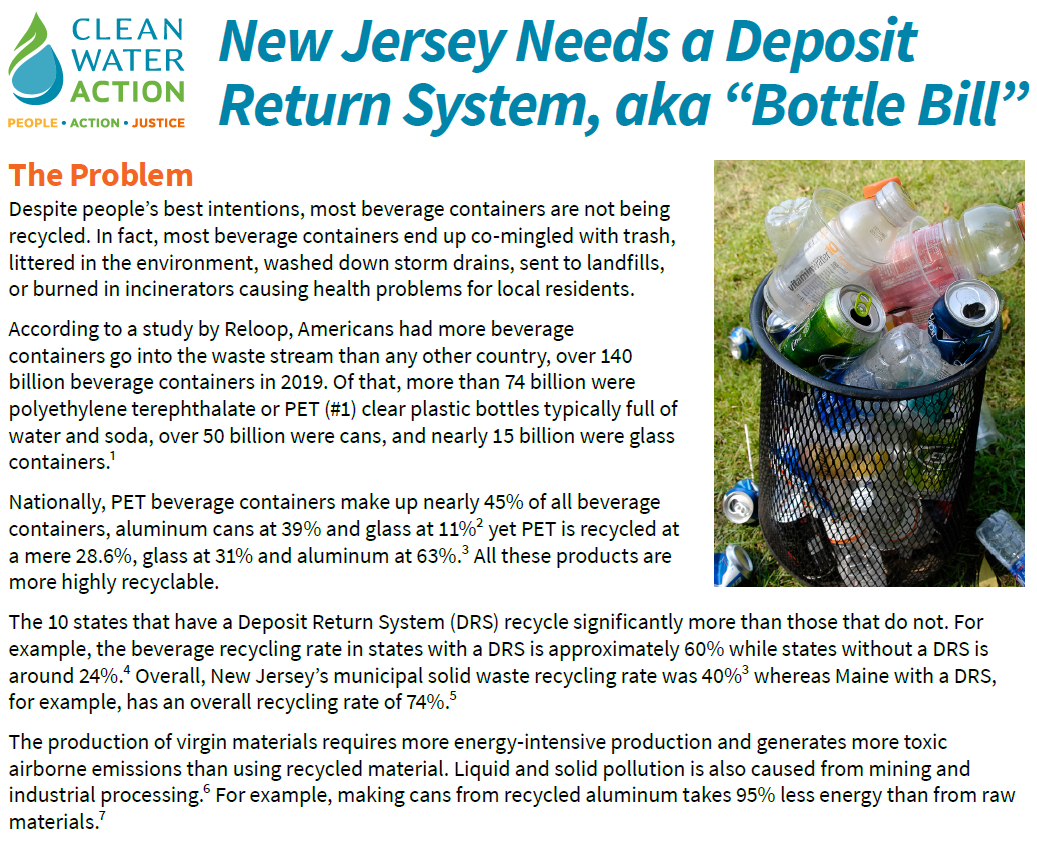Download the Fact Sheet (PDF) Here
The Problem
Despite people’s best intentions, most beverage containers are not being recycled. In fact, most beverage containers end up co-mingled with trash, littered in the environment, washed down storm drains, sent to landfills, or burned in incinerators causing health problems for local residents.
According to a study by Reloop, Americans had more beverage containers go into the waste stream than any other country, over 140 billion beverage containers in 2019. Of that, more than 74 billion were polyethylene terephthalate or PET (#1) clear plastic bottles typically full of water and soda, over 50 billion were cans, and nearly 15 billion were glass containers ¹.
Nationally, PET beverage containers make up nearly 45% of all beverage containers, aluminum cans at 39% and glass at 11% ² yet PET is recycled at a mere 28.6%, glass at 31% and aluminum at 63% ³. All these products are more highly recyclable.
The 10 states that have a Deposit Return System (DRS) recycle significantly more than those that do not. For example, the beverage recycling rate in states with a DRS is approximately 60% while states without a DRS is around 24% ⁴. Overall, New Jersey’s municipal solid waste recycling rate was 40 percent ³ whereas Maine with a DRS, for example, has an overall recycling rate of 74% ⁵.
The production of virgin materials requires more energy-intensive production and generates more toxic airborne emissions than using recycled material. Liquid and solid pollution is also caused from mining and industrial processing ⁶. For example, making cans from recycled aluminum takes 95% less energy than from raw materials ⁷.
Toxic gas emissions are produced both in the process of replacing bottles and cans that are not recycled as well as those that end up in incinerators. These toxins detrimentally affect human health, causing respiratory infections, asthma, birth defects, heart disease and various cancers ⁸.
Most roadside litter is beverage containers, 40%-60% nationally ⁹. States with Bottle Bills have reduced their beverage litter up to 84 percent and overall litter up to 65 percent ¹⁰.
As recycling increases in states with bottle bills, not only is energy saved and waste and toxins reduced but studies have shown millions of dollars of savings to state governments ¹¹.
More jobs will be created with a bottle bill. Reports show there may be a few hundred initial job losses followed by hundreds and even thousands of jobs created in the long run, as seen in New York, Michigan, and Oregon ¹². Studies in New York have shown employment and overall economy increased with implementation of the Bottle Bill, resulting in approximately 9,000 direct and indirect jobs created ¹³.
The Solution
A 10-cent deposit on most beverage containers, including water, soft drinks, sport drinks, juice, beer and wine would save New Jersey energy, prevent litter, keep recyclable materials out of our landfills and incinerators, and save taxpayers money in waste management.
The other ten states with bottle bills, many of whom have had systems in place for decades, include California, Connecticut, Hawaii, Iowa, Massachusetts, Michigan, New York, Oregon, and Vermont ¹⁴. New Jersey should be a leader and join this group with the best Deposit Return System.
Basic elements of a Good Bottle Bill
Set a 10-cent deposit on most beverage containers, including water, soft drinks, sport drinks, juice, mineral and sparkling water, kombucha, beer, wine coolers, distilled spirits cooler, and wine.
Containers should include those made of plastic, aluminum, and glass.
Prohibit the siting of “chemical recycling” facilities (also known as pyrolysis, gasification et al) anywhere in the Garden State and their false claims of safely converting plastic into a gas, chemical, tar or oil.
The Coalition
Clean Water Action is co-leading a statewide coalition with a growing number of New Jersey residents and environmental groups including Beyond Plastics, Clean Ocean Action, Environment New Jersey, New Jersey Environmental Justice Alliance, Reloop, Sierra Club, and Surfrider Foundation. Together, we successfully secured the 2020 Bag and Polystyrene Ban law (effective May 2022) and are advocating to further reduce single-use beverage containers as we seek passage of the strongest Deposit Return System possible.
For more information, contact Marta Young, Clean Water Action, Zero Waste Specialist .
_________________________________________
1
2
3
4
5
6
7
8
9
10
11
12
13
14
